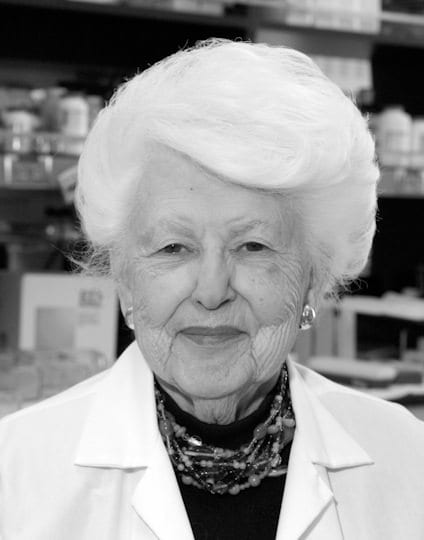
The only woman in a class of 400, Irene E. Karl graduated in 1937 summa cum laude from the University of Wisconsin with a bachelor’s degree in chemistry. Three years later, she was the first woman to be awarded a Ph.D. in science from that University. Karl worked as a biochemist from 1940-43 at Jewish Hospital in St. Louis before taking a hiatus to raise her family.
Dr. Karl resumed her career in 1959 when she became a research associate in Preventive Medicine at the Washington University School of Medicine. From there she advanced through the academic ranks to become an instructor for the Metabolism Division in 1966, a Research Associate Professor of Medicine in 1974, and a Research Professor of Medicine in 1981.
For more than 50 years, Karl’s research focused on metabolic disorders, such as diabetes and sepsis. Her novel observations into the pathogenesis of sepsis have been termed “groundbreaking” by leading experts in the field. Her work directly led to new approaches to the treatment of sepsis, a leading cause of death in neonatal and surgical intensive care units.
Dr. Karl published over 150 articles in scientific journals, such as the Journal of the American Medical Association, the Journal of Immunology, and the New England Journal of Medicine, in which she published her last article at the age of 87.
In 1983, she and her husband, Dr. Michael Karl established the Irene E. and Michael M. Karl Professorship in Endocrinology and Metabolism at Washington University. The Karls were the first husband and wife team to be so honored. The first recipient of this endowed professorship was Washington University’s first director of endocrinology and metabolism, William Daughaday, who was later succeeded by Philip Cryer. The Michael and Irene Karl Lecture, part of the University’s Masters in Medicine series, was created in honor of the Karls in 1985.
Dr. Karl was the recipient of many awards including the School of Medicine’s Second Century Award. In 2002, she was the first female scientist to receive the Jewish Federation of St. Louis’ Woman of Valor Award and the Albert Einstein Award from Technion University in Israel. Dr. Irene Karl died in 2006.